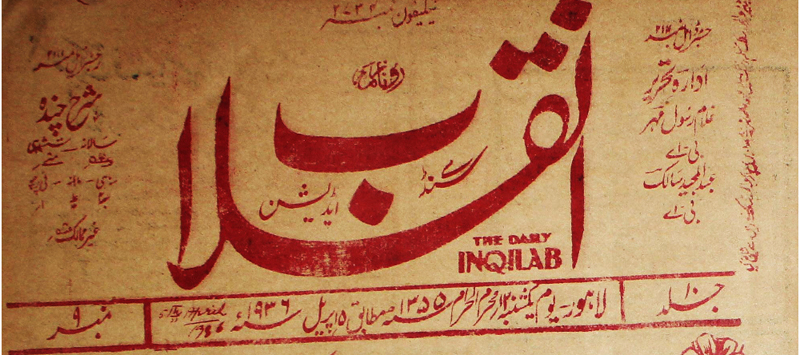After Zamindar, PUCIT launches digital archives of Urdu paper Inqilab


These archives are available at inquilab.pucit.edu.pk. The college had also launched the digital archives of Zamindar earlier this year as part of a larger effort to make a digital library of historical documents and make it available to public at large free of cost.
PUCIT Principal Dr Syed Mansoor Sarwar said on Friday that Digital Archives Project began in 2011.
“Currently, the digital editions of Inquilab are available from January 1928 to September 1941 with the exception of those that were missing in the university archives,” he said. Inqilab remains an important source of pre-partition and post-partition information for researchers in political science, journalism and social sciences.
Dr Syed Mansoor Sarwar said that PUCIT would continue to add to these archives other newspapers and documents of historical importance to facilitate researchers and public at large.
“PUCIT intends to add to this project the missing editions to Zamindar and Inqilab, as well as add digital versions of Paisa Akhbar and Civil & Military Gazette, the famous UK-based English daily. The college is in negotiation with the Punjab Public Library and Dayal Singh Library in this regard,” Sarwar stated. “We consider such public service a part of PUCIT’s Corporate Social Responsibility,” he added.
Dr Sarwar thanked the team who has helped develop the digital library of Zamindar and Inqilab, including Muhammad Hamid Chaudhry, Asim Siddique, Sohaib Anwar, Fiza Khalid and GIS Centre graduates Saba Nawaz, Mahwish Arif, Nudrat Babar and Bushra Bhatti.
Gene D Overstreet and Marshall Windmiller write in their book Communism In India, that Ghulam Hussain, the first communist leader in Lahore, started Inqilab in mid 1922 with Rs 22,000 that he had received from MN Roy and/or the Soviet Embassy in Afghanistan during and after Ghulam Hussain’s visit to Kabul in March 1922. MN Roy, a contemporary of Mohandas Karamchand Gandhi, was the founder of the communist movement in the sub-continent during the second decade of the 20th century.
Ghulam Rasool Mehr and Abdul Majeed Salik remained its editors for many years. Among other things, Inqilab and Abdul Majeed Salik became famous for creating a controversy regarding the date of birth of Sir Allama Muhammad Iqbal.
In two of the issues of Inqilab in 1938 and 1955, Abdul Majeed Salik argued that Allama Iqbal was born on February 22, 1873 and not December 1976 as reported in Inqilab on May 7, 1938, or November 9, 1877, as commonly accepted.
Published in Daily Times, July 8th 2018.
Leave a Comment